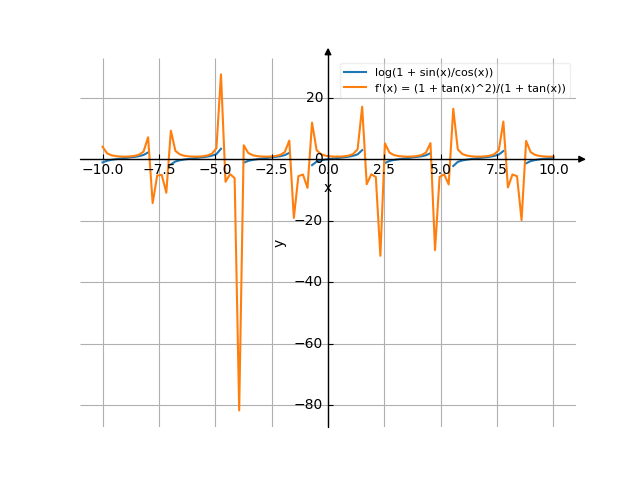Derivative of ln(1+sinx/cosx)
The solution
You have entered
[src]
/ sin(x)\ log|1 + ------| \ cos(x)/
$$\log{\left(\frac{\sin{\left(x \right)}}{\cos{\left(x \right)}} + 1 \right)}$$
d / / sin(x)\\ --|log|1 + ------|| dx\ \ cos(x)//
$$\frac{d}{d x} \log{\left(\frac{\sin{\left(x \right)}}{\cos{\left(x \right)}} + 1 \right)}$$
Detail solution
-
Let .
-
The derivative of is .
-
Then, apply the chain rule. Multiply by :
-
Differentiate term by term:
-
The derivative of the constant is zero.
-
Apply the quotient rule, which is:
and .
To find :
-
The derivative of sine is cosine:
To find :
-
The derivative of cosine is negative sine:
Now plug in to the quotient rule:
-
The result is:
-
The result of the chain rule is:
-
-
Now simplify:
The answer is:
The first derivative
[src]
2
sin (x)
1 + -------
2
cos (x)
-----------
sin(x)
1 + ------
cos(x)
$$\frac{\frac{\sin^{2}{\left(x \right)}}{\cos^{2}{\left(x \right)}} + 1}{\frac{\sin{\left(x \right)}}{\cos{\left(x \right)}} + 1}$$
The second derivative
[src]
/ 2 \
| sin (x) |
| 1 + ------- |
/ 2 \ | 2 |
| sin (x)| | cos (x) 2*sin(x)|
|1 + -------|*|- ----------- + --------|
| 2 | | sin(x) cos(x) |
\ cos (x)/ | 1 + ------ |
\ cos(x) /
----------------------------------------
sin(x)
1 + ------
cos(x)
$$\frac{\left(\frac{2 \sin{\left(x \right)}}{\cos{\left(x \right)}} - \frac{\frac{\sin^{2}{\left(x \right)}}{\cos^{2}{\left(x \right)}} + 1}{\frac{\sin{\left(x \right)}}{\cos{\left(x \right)}} + 1}\right) \left(\frac{\sin^{2}{\left(x \right)}}{\cos^{2}{\left(x \right)}} + 1\right)}{\frac{\sin{\left(x \right)}}{\cos{\left(x \right)}} + 1}$$
The third derivative
[src]
/ 3 2 \
| / 2 \ / 2 \ |
| | sin (x)| | sin (x)| |
| |1 + -------| 3*|1 + -------| *sin(x)|
| | 2 | 4 2 | 2 | |
| \ cos (x)/ 3*sin (x) 4*sin (x) \ cos (x)/ |
2*|1 + -------------- + --------- + --------- - -----------------------|
| 2 4 2 / sin(x)\ |
| / sin(x)\ cos (x) cos (x) |1 + ------|*cos(x) |
| |1 + ------| \ cos(x)/ |
\ \ cos(x)/ /
------------------------------------------------------------------------
sin(x)
1 + ------
cos(x)
$$\frac{2 \cdot \left(- \frac{3 \left(\frac{\sin^{2}{\left(x \right)}}{\cos^{2}{\left(x \right)}} + 1\right)^{2} \sin{\left(x \right)}}{\left(\frac{\sin{\left(x \right)}}{\cos{\left(x \right)}} + 1\right) \cos{\left(x \right)}} + \frac{\left(\frac{\sin^{2}{\left(x \right)}}{\cos^{2}{\left(x \right)}} + 1\right)^{3}}{\left(\frac{\sin{\left(x \right)}}{\cos{\left(x \right)}} + 1\right)^{2}} + \frac{3 \sin^{4}{\left(x \right)}}{\cos^{4}{\left(x \right)}} + \frac{4 \sin^{2}{\left(x \right)}}{\cos^{2}{\left(x \right)}} + 1\right)}{\frac{\sin{\left(x \right)}}{\cos{\left(x \right)}} + 1}$$
The graph


![Find the derivative of y' = f'(x) = ln(1+sinx/cosx) (ln(1 plus sinus of x divide by co sinus of e of x)) - functions. Find the derivative of the function at the point. [THERE'S THE ANSWER!] ln(1+sinx/cosx)](/media/krcore-image-pods/176/hash/derivative/0/43/fef3e3a01a91d7060b0f57c75e14b.png)
 Derivative of x*2^x
Derivative of x*2^x
 Derivative of 1/(x+3)
Derivative of 1/(x+3)
 Derivative of 1-2*x
Derivative of 1-2*x
 Derivative of 3*sin(2*x)
Derivative of 3*sin(2*x)